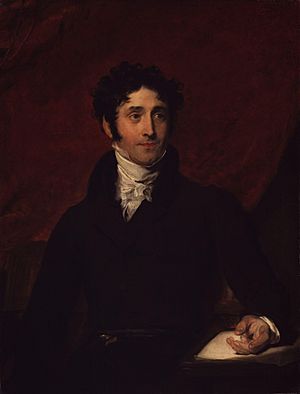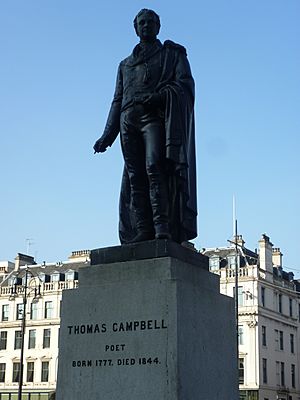Thomas Campbell (poet) facts for kids
Quick facts for kids
Thomas Campbell
|
|
|---|---|

Portrait by Sir Thomas Lawrence around 1810
|
|
| Born | 27 July 1777 Glasgow, Scotland |
| Died | 15 June 1844 (aged 66) Boulogne, France |
| Resting place | Westminster Abbey |
| Nationality | Scottish |
| Period | 1790s–1840s |
| Signature | |
 |
|

Thomas Campbell (born July 27, 1777 – died June 15, 1844) was a famous Scottish poet. He helped start important groups like the Clarence Club and the Literary Association of the Friends of Poland. He also played a key role in planning what became University College London.
In 1799, he wrote a well-known poem called "The Pleasures of Hope." This poem was a traditional 18th-century teaching poem written in heroic couplets (pairs of rhyming lines). Thomas Campbell also wrote several popular patriotic war songs. These include "Ye Mariners of England," "The Soldier's Dream," "Hohenlinden," and "The Battle of the Baltic" (written in 1801).
Early Life and Education
Thomas Campbell was born in High Street, Glasgow in 1777. He was the youngest of eleven children. His father, Alexander Campbell, was a merchant who traded tobacco. The family faced financial difficulties after the American Revolutionary War.
Both of Campbell's parents loved learning. His father was friends with a philosopher named Thomas Reid, and Campbell was named after him. His mother enjoyed literature and music.
Thomas Campbell went to the High School of Glasgow and then the University of Glasgow. He won awards for his skills in classics (ancient Greek and Roman studies) and poetry. During his school holidays, he worked as a tutor in the western Scottish Highlands. Some of his early poems, like Glenara and Ballad of Lord Ullin's Daughter, were written during this time while he visited the Isle of Mull.
In 1797, Campbell moved to Edinburgh to study law. He continued to earn money by tutoring and writing. He met other famous writers and thinkers in Edinburgh, including Sir Walter Scott. His time in Edinburgh inspired poems such as The Wounded Hussar.
Poetic Career
In 1799, Thomas Campbell published "The Pleasures of Hope." This poem became very popular because it discussed important topics of the time, such as the French Revolution, the division of Poland, and the end of slavery.
In 1800, Campbell traveled to Germany. While there, he wrote some of his best songs, including "Hohenlinden," "Ye Mariners of England," and "The Soldier's Dream." The famous composer Beethoven later set "The Soldier's Dream" to music. He also wrote "The Battle of the Baltic" after returning home.
In 1803, Campbell married his cousin, Matilda Sinclair, and they moved to London. In 1805, he started receiving a government pension, which helped him financially. He also worked for Star newspaper, translating foreign news.
In 1809, he published Gertrude of Wyoming, a long poem about the Wyoming Valley in Pennsylvania. A writer named Francis Jeffrey told Campbell that he should let his ideas flow more freely when writing.
In 1812, Campbell gave lectures on poetry in London. He was also encouraged to apply for a literature teaching job at Edinburgh University. In 1814, he visited Paris and met important thinkers there. In 1815, he received a large inheritance, which further eased his financial worries.
He spent years working on his Specimens of the British Poets, which was published in 1819. This work included a selection of poems, short biographies of poets, and an essay about poetry. In 1820, he became the editor of the New Monthly Magazine.
Later Life and Legacy

Thomas Campbell played a big part in creating University College London. He visited Berlin to study the German education system, and his ideas were used to help set up the new university. He was also elected as the Lord Rector of Glasgow University from 1826 to 1829.
He stopped editing the New Monthly Magazine in 1830. Campbell strongly supported the people of Poland. When Warsaw was captured by the Russians in 1831, he was deeply saddened. He helped start the Literary Association of the Friends of Poland in London to support their cause. In 1834, he traveled to Paris and Algiers, writing about his experiences in Letters from the South.
Campbell's wife died in 1828. Of his two sons, one passed away as a baby, and the other became ill. His own health declined, and he slowly stepped away from public life. Thomas Campbell died in Boulogne, France, on June 15, 1844. He was buried on July 3, 1844, in Westminster Abbey at Poet's Corner, a special place for famous writers.
Other works by Campbell include a book about the famous actress Mrs Siddons (1834) and a poem called "The Pilgrim of Glencoe" (1842). His life and works have been studied and published in several collections.
Images for kids
See also
 In Spanish: Thomas Campbell (poeta) para niños
In Spanish: Thomas Campbell (poeta) para niños
 | William Lucy |
 | Charles Hayes |
 | Cleveland Robinson |

